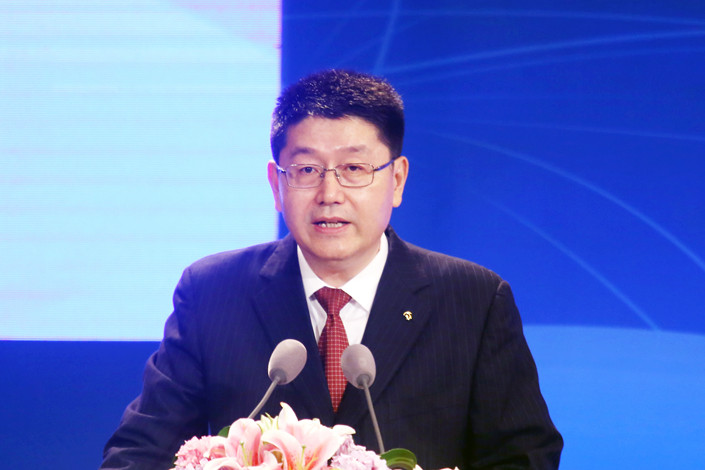Update: Former Communications Bank Head Appointed Chair of China’s Biggest Sovereign Fund

China has appointed a veteran banker to fill the chair of its biggest sovereign wealth fund.
Peng Chun, former chairman of the Bank of Communications Co. Ltd. — one of the country’s “Big Five” state-owned commercial lenders — has been appointed chair of China Investment Corp. (CIC), which manages part of the investment of the nation’s foreign exchange reserves, Caixin has learned. The post had been unoccupied for over two years.
CIC Executive Vice President Ju Weimin has been promoted to president, replacing Tu Guangshao, sources said on condition of anonymity.
CIC is the world’s second-largest sovereign wealth fund by assets, after Norway’s Government Pension Fund Global, according to the Sovereign Wealth Fund Institute, a data provider.
It is understood the ruling Communist Party’s top organization department, which oversees high-ranking personnel moves, announced the appointments at CIC’s headquarters in Beijing on Tuesday morning.
Peng, 57, has spent most of his career at the Bank of Communications. Colleagues described him as having a calm disposition. Peng made significant changes to the bank’s major businesses and personnel after he was promoted to chair in early 2018, Caixin has learned. He has previous experience at CIC, where he served as a vice president from 2010 to 2013.
Ju, 55, joined CIC in April 2015. His career was forged climbing up the ranks of state-owned conglomerate Citic Group Corp. Ltd. In 2010, he became a vice president and chief financial officer of the group, whose businesses include finance, property, energy and resources. Former colleagues who spoke with Caixin described him as low-profile and professional. Ju has good English skills and a deep understanding of accounting systems and financial markets at home and abroad, they said.
CIC’s former chairman Ding Xuedong departed in February 2017 to become a deputy secretary-general of China’s State Council. He became executive deputy secretary-general of the State Council in May.
Tu, Ju’s predecessor, is retiring at 60. Before joining CIC in 2016, he was executive vice mayor of Shanghai, overseeing the metropolis’ economic and financial issues. He previously held positions at the China Securities Regulatory Commission, the nation’s top securities watchdog, and the People’s Bank of China, its central bank.
CIC was founded by the Ministry of Finance in 2007 to diversify the investment of China’s foreign exchange holdings, which have totaled more than $3 trillion in recent years. The company held total assets of $941.4 billion at the end of 2017, nearly five times its initial registered capital of $200 billion, according to its latest annual report. It posted its best annual performance that year with a 37.5% increase in net profit, partly thanks to record returns from overseas portfolios.
CIC operates three major subsidiaries, including domestic investment arm Central Huijin Investment Ltd., and overseas arms CIC Capital Corp. and CIC International Co. Ltd. Ju is also president of CIC Capital, which specializes in direct investments. CIC International focuses on public equity and bond investments, as well as hedge fund and real estate investments.
“CIC’s overseas investments are not welcomed everywhere. People worry about whether we have any political purposes,” former CIC chairman Lou Jiwei previously told Caixin. “The proportion of (our) investments is limited, and (we) need to be subject to various kinds of scrutiny.”
Since 2017, CIC has partnered with foreign sovereign wealth funds like Singapore’s Temasek Holdings (Private) Ltd., and global financial giants to set up cooperation funds. Among its partners are U.S. investment bank Goldman Sachs Group Inc., U.K.-based HSBC Holdings PLC, and Japan-based Nomura Holdings Inc.
China’s other major sovereign wealth funds include the central bank-backed SAFE Investment Co. Ltd., and the National Social Security Fund, which rank fifth and 12th among the world’s sovereign wealth funds by assets.
Contact reporter Lin Jinbing (jinbinglin@caixin.com)

- 1Cover Story: China Carves Out a Narrow Path for Offshore Asset Tokenization
- 2Drownings Shake Chinese Enthusiasm for Travel to Russia
- 3Over Half of China’s Provinces Cut Revenue Targets
- 4Li Ka-Shing’s Port Empire Hit by Forced Takeover Amid Panama Legal Dispute
- 5In Depth: China’s Mutual Fund Industry Faces Overhaul After a Banner 2025
- 1Power To The People: Pintec Serves A Booming Consumer Class
- 2Largest hotel group in Europe accepts UnionPay
- 3UnionPay mobile QuickPass debuts in Hong Kong
- 4UnionPay International launches premium catering privilege U Dining Collection
- 5UnionPay International’s U Plan has covered over 1600 stores overseas





